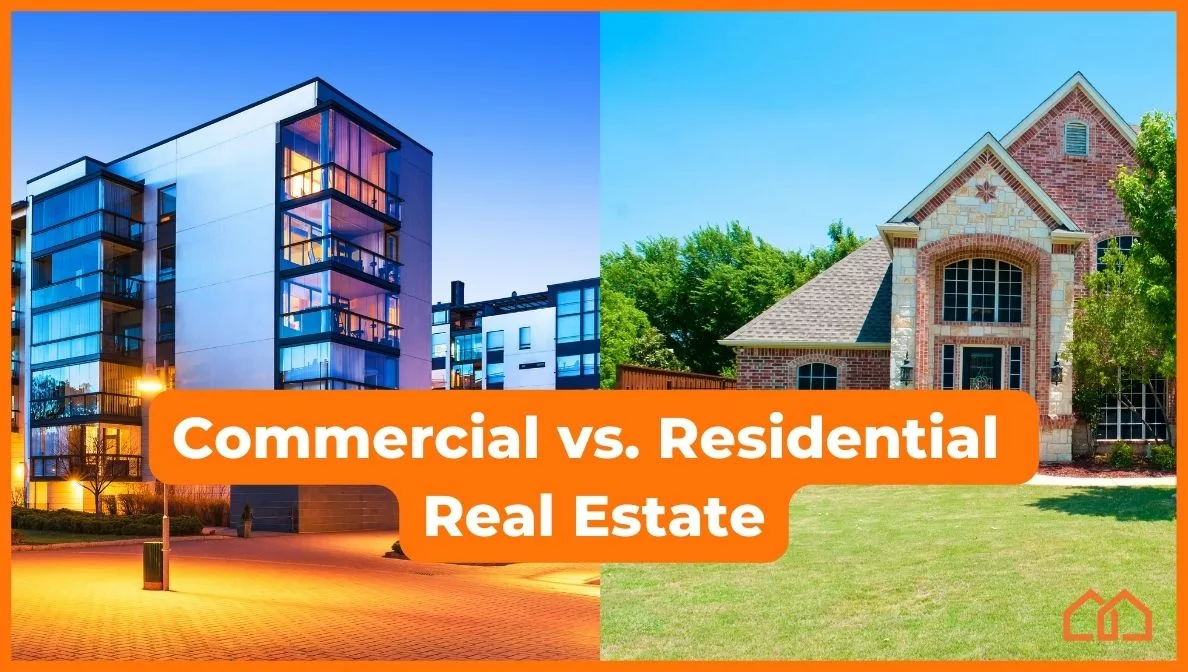Commercial VS. Residential Real Estate
One question real estate investors ask is whether they should specialize in commercial or residential real estate. Each type of property investment has its own advantages and risks. An experienced brokerage can help you understand the key differences between both property types and which real estate properties to choose. For starters, here are the main differences:
- Commercial properties include non-residential real estate like retail spaces, storage units, and office buildings. They are good for investors who can handle higher risk in exchange for higher rewards.
- Residential properties include houses in which people reside like single family homes, townhouses, condos, and apartments. They are ideal for investors who prefer to be more hands-on and encounter less risk. It’s also an excellent way to enter the world of real estate investments and generate passive cash flow.
The good news is no matter what property type you choose, there is value in both types of real estate. You can even get more benefits when you diversify your portfolio with these different property classes. Whether you want to explore commercial real estate investing or the residential real estate market, there is a real estate agent who can help you.
Choosing Residential or Commercial Real Estate Investing
Your choice depends on what you want to gain by investing in real estate. Take some time to think about your short and long-term goals. If you want smaller but quicker returns, rehabbing or wholesaling a residential property might be the way to go. On the other hand, commercial properties offer attractive benefits like long-term passive income.
How to Choose Properties for Your Portfolio
No two real estate investors are the same, so choosing the right investment options that suit your circumstances and abilities is important. As you explore residential vs. commercial real estate, consider these factors:
1. Your Goals
Do you want to keep things small and have enough money for retirement, or do you want to expand your holdings for more long-term wealth? Commercial properties are associated with higher risk and profits, while residential properties have lower risk and gradual profit gain. Both property types have the potential to give you the rental income you desire. It’s best to speak with your real estate agent and a financial expert to decide what property type can give the return on investment you seek.
2. Your Ability to Handle Risk
Commercial investments involve more risk than residential real estate. This is due to the higher upfront costs and the increased risk of resident turnover. However, the rewards are higher when the scenario pans out correctly. More backup funds give you a higher risk tolerance and enable you to buy real estate with higher property values.
3. Your Liquid Capital
Commercial investments cost more than residential real estate. The amount you have in the bank (and what loans you qualify for) determine what type of property is accessible to you. Renting to commercial tenants like business owners can produce a higher monthly income than residential leases, but this higher reward also involves more risk — so if you have a strong financial backup, you can explore commercial properties.
4. Difficulty Level
Across the board, residential real estate is easier to manage, especially when you recruit the expertise of a hands-on property manager. This allows you just to buy the property and hand it over to someone else who will do all the marketing, administrative work, and financials. For instance, a homeowner can buy a second home and rent their first house, making it a relatively easy investment sphere to enter.
It’s up to each investor to understand their financial capabilities and investment preferences. This will help everyone create the investment portfolio that is right for them.
Diversify your Portfolio
Many investors don’t just buy one type of property. In fact, lack of diversity in your portfolio can be riskier. Your portfolio doesn’t have to be “all or nothing,” either. If you feel comfortable investing in both types of assets, then proceed!
The Universal Benefits
No matter your preferred type of investments, residential and commercial investments will diversify your portfolio. Investing in any real estate also grants you some financial perks that are hard to find elsewhere, such as:
- Some nice tax deductions.
- High probability of appreciation.
- Consistent trends of rising rents.
- One of the most reliable ways to secure and grow wealth.
When you make the right plan with a real estate professional based on your needs, you can rest assured that you reap these benefits regardless of asset type.
Differences Between Commercial and Residential Real Estate
Now that you know what benefits are available to you, here are the main differences between commercial and residential real estate. What are they exactly, and what are their pros and cons?
Residential Real Estate Differences
Residential investments are typically envisioned as single-family homes, but they actually include everything from residential single-family rentals to four-unit rentals. Specifically, these properties classify as residential:
- Single-family homes
- Single apartments
- Duplexes
- Triplexes
- Quadruplexes/Fourplexes
- Townhouses
- Condos
- Cooperatives
- Mobile homes
Commercial Real Estate Differences
On the other hand, commercial properties are much more than office spaces. This category includes anything with more than five units, or a property used for business. This includes:
- Retail spaces
- Offices
- Hotels
- Apartment complexes
- Multifamily buildings
- Manufacturing facilities
- Warehouses
- Raw land that can be developed
Residential Investment Pros and Cons
If you’re new to real estate investment and don’t want to play with higher-risk properties, then residential real estate is the way to go. Here are the pros and cons.
Pros of Residential Investments
- Lower upfront cost makes it more accessible to the everyday investor.
- Lower risk due to less upfront cost and a higher chance of longer leases.
- Universal appeal since everybody needs a home. Not everybody needs business space!
- Easier to get loans to buy residential properties vs. commercial loans.
- Simpler leases compared to commercial properties.
Cons of Residential Investments
- Less risk means less reward. Residential properties generally bring fewer returns than commercial properties.
- Residential rentals can’t use a triple net lease, which means as the landlord, you are still responsible for taxes and upkeep.
- While commercial properties are often in public spaces that are constantly watched, residential properties can be in secluded areas that increase their risk for neglect or damage.
- You must screen residents more carefully than with commercial leases to reduce risk since businesses are more likely to keep up with a commercial rental.
Commercial Investment Pros and Cons
Commercial investments have a lot to offer anyone willing to accept the higher risk factor, stringent loan terms, and potential volatility of business tenant turnover.
Pros of Commercial Investments
- Potential for more returns. High risk can pay off with higher commercial lease profits.
- Commercial properties can have a triple net lease, which means the landlord doesn’t need to pay taxes or upkeep.
- Commercial properties are often in public spaces, reducing their risk of neglect or damage.
- Commercial leases have businesses as residents, which are more likely to ensure that the property stays in good condition. Business budgets can go to upkeep and taxes, while residential residents may not be as financially robust.
Cons of Commercial Investments
- Higher upfront cost makes it less accessible to the everyday investor.
- Higher risk due to more upfront cost and less chance of stable leases.
- Lacks universal appeal since not everybody needs business space.
- Harder to get loans vs. with residential properties.
- Lease agreements are more complicated since there are several types to choose from.
Residential Real Estate Investments with Marketplace Homes
Whether you’re exploring what asset type to acquire, need to sell properties in bulk, or obtain more real estate investments to grow your business, Marketplace Homes is here to help you. We can walk you through your choices to determine the best option for you. If you would like to diversify your portfolio by adding residential properties, contact us today.
At Marketplace Homes, we specialize in residential and new construction investments, making us a valuable partner to have as you plan to diversify your portfolio. Today we can explore the benefits and considerations of both investment types so that you can make the best plans for your budget, skill set, and risk preferences.
Alicia Persson is a Content Strategist SEO writer at Marketplace Homes, utilizing previous years of experience on real estate teams that specialized in investments and property management. Before she joined Marketplace Homes, she was also a freelance writer for 7 years, leading to a specialization in real estate and home living content for boutique digital marketing agencies. During her writing years, she learned the basics of SEO and gained experience writing for many different clients, making her versatile at creating diverse content.
She is a proud University of Virginia master’s graduate and enjoyed her undergraduate years at the University of Mary Washington. When Alicia is not writing, she plays keytar and sings in a local 90’s rock cover band, or she spends time with her amazing family.


